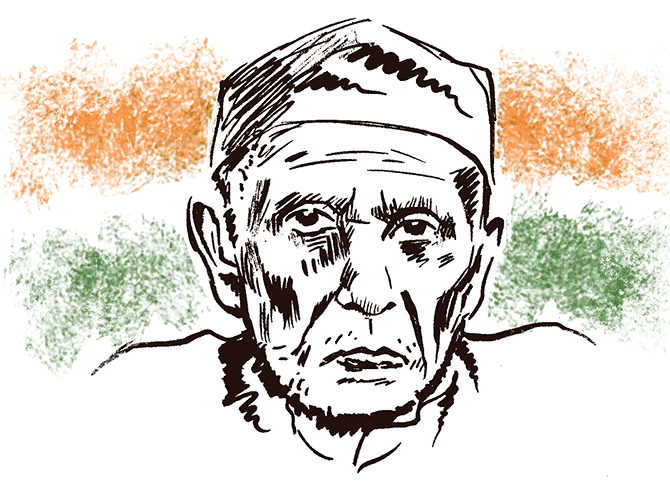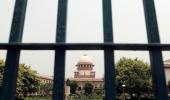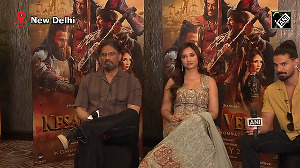The Right to Privacy judgment reinstates the individual as VIP, says Mitali Saran.
Illustration: Dominic Xavier/Rediff.com

On Thursday, August 24, a nine-judge Supreme Court bench delivered a unanimous verdict upholding privacy as a Fundamental Right intrinsic to Article 21, the right to life and personal liberty.
You cannot possibly overstate the importance of this judgment. If you don't like detail, just eyeball its magnitude by counting the number of pages it took up in your Friday morning newspaper. I counted eight pages in mine.
Sounds nuts, right? It's 2017. Do you have the slightest doubt that privacy is fundamental to living your life in peace?
And yet, until now it has never been legally spelled out, even as privacy is being battered by governments and corporations who see leverage and money in ever more access to your personal life.
Hearing Justice K S Puttaswamy's petition for a Fundamental Right to Privacy was made urgent by another Supreme Court petition challenging the government's attempt to forcibly link PAN and Aadhaar numbers.
The petitioners argued that collecting, sharing, selling, or using biodata, mandatorily and without consent, violates bodily integrity, informational self-determination, and personal autonomy.
They were barred from arguing on grounds of privacy, because the government insisted that there is no such thing, and that the 9-judge bench hearing that matter should first come to a decision.
In fact the government took an obnoxious anti-people, anti-rights legal stand, arguing that the idea of privacy is bogus, that the Constitution deliberately left it out, that Indians don't need privacy because they tell their life stories within five minutes to strangers on a train, that the poor don't care about privacy and are too backward to deserve it, that it's an elitist concern, that it impedes transparency and social justice.
It argued that making privacy a Fundamental Right would open a flood of litigation.
Damn straight it will.
This judgment is, of course, a much-needed boost for those challenging Aadhaar while the government and its cheerleaders sing loud hosannas to an intrusive data raj in the name of prosperity and national security.
Keep your eye on those hearings, good people, if you oppose legal sanction for State surveillance and non-consensual data access.
But Justice K S Puttaswamy (Retd) vs Union of India is not a judgment so much as a legal earthquake.
It explicitly overturns the infamous 1976 ADM Jabalpur ruling which allowed Articles 20 and 21 to be suspended in a situation of Emergency. (Historical frisson: Justice Chandrachud fils overturned Justice Chandrachud <en<père).
It places sexual orientation in the realm of privacy, eloquently shredding the illiberal reasoning in the Koushal vs Naz Foundation ruling which junked LGBTQ rights.
It is now probable that LGBTQ Indians will win an absolutely foundational victory.
The judgment touches on many things that liberal-minded Indians have been growling about—what we eat and wear, who we love, what we say to whom, what we are forced to do in schools.
I'm not a lawyer, but it seems to support challenges to such momentous things as the beef ban, and those who would impose social vetoes on food or thought and expression, and would force religious compliance, social homogeneity, and brute nationalism.
It is, in sum, a clear, elegant, and rousing reaffirmation of India's best liberal, rights-based, pluralist, Constitutional values.
It comprehensively rejects majoritarianism, restrains the State from overreach and impunity, and reinstates the individual as the autonomous building block of national life, with a 'right to be let alone'.
The judgment dropped on India like one of those faraway mega-tonne bombs that isn't heard so much as felt as a blast wave.
It isn't yet law; it merely sets the ground for law that the government must now pass. Its contours will continue to evolve on a case-by-case basis.
Like all Fundamental Rights, it is subject to reasonable restrictions, which will be much debated.
But for hundreds of millions of Indians, Thursday August 24 was a great day.
Days like this are rare at a time when justice can be so perverted that a State prepares for shutdown and puts the army on standby in the face of bullying threats because an alleged rapist might be pronounced guilty.
It was a day when Twitter felt like a warm bath of endorphins, and right wing trolls were too flattened to fling faeces.
The government did made a contemptible spectacle of itself, trying to claim credit for what it brazenly opposed, but that's all right, we all needed a good laugh.
The euphoria that this judgment produced, the goosebumps and lightness, is how citizens want to feel -- validated, free, joyous, and hopeful about India.
And it proved the power of a single person with initiative.
I'd like to envelop 91-year-old Justice K S Puttaswamy (retd) in my arms, and give him the hug of his life.











